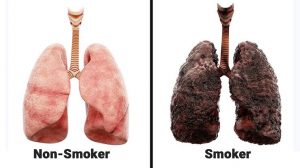Tobacco contains nicotine, a highly addictive drug that is responsible for more damage to health than all other drugs (including alcohol) combined. Nicotine can increase alertness, reduce irritability and decrease skeletal muscle tone. Tolerance can occur to some effects of nicotine. The toxicity of tobacco is caused by the many chemicals in the smoke, some of which are known cancer causing agents.
Tobacco induced damages
Serious diseases associated with tobacco smoking include lung cancer, chronic obstructive pulmonary disease, coronary heart disease and peripheral vascular disease. Smoking during pregnancy significantly reduces the birth weight of babies and increases perinatal mortality. It may also lead to ectopic pregnancy (when the embryo implants outside the uterus).
In men it can cause narrowing of arteries and a resultant poor blood flow which can cause poor erection. Tobacco use is also associated with bad breath, increased frequency of asthmatic attacks, pneumonia, metabolic diseases like diabetes, stained teeth, increased risk of peptic ulcer disease and many other disorders.

Why do you cough when you inhale the smoke?
This is because the chemicals or particles contained in the tobacco irritate the air passages and lungs, so the body tries to get rid of them by forming mucus plugs and stimulating the cough reflex.
Way forward
Keeping off tobacco is the solution. It may be difficult but it results in reduction of the health risks incurred by smoking. Tobacco can cause a withdrawal syndrome (lasting 23 weeks) that includes craving for tobacco, irritability, hunger and often weight gain. These symptoms may be reduced by appropriate counseling in conjunction with nicotine replacement therapy (NRT) (e.g. chewing gum, nasal sprays, skin patches) or bupropion (amfebutamone), a drug that was originally developed as an antidepressant. After 1 year, about 20-30% of patients taking NRT or bupropion successfully quit smoking, compared with only 10% of controls given a placebo.
Image credit:
hasan jasim
Von gov

Pharm. Fatima Ajide J. is a current pharmacology student at Olabisi Onabanjo University.
She has a passion in researching about the interaction between organs and drugs (i. e. the Pharmacodynamic and Pharmacokinetics).
A practicing Muslim and hobbies are tourism, reading and Research.

